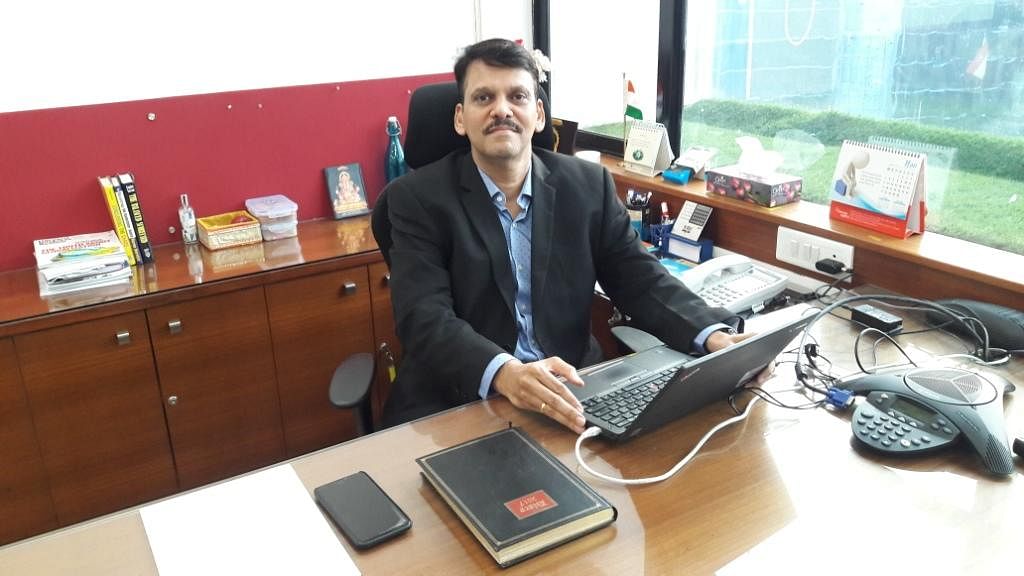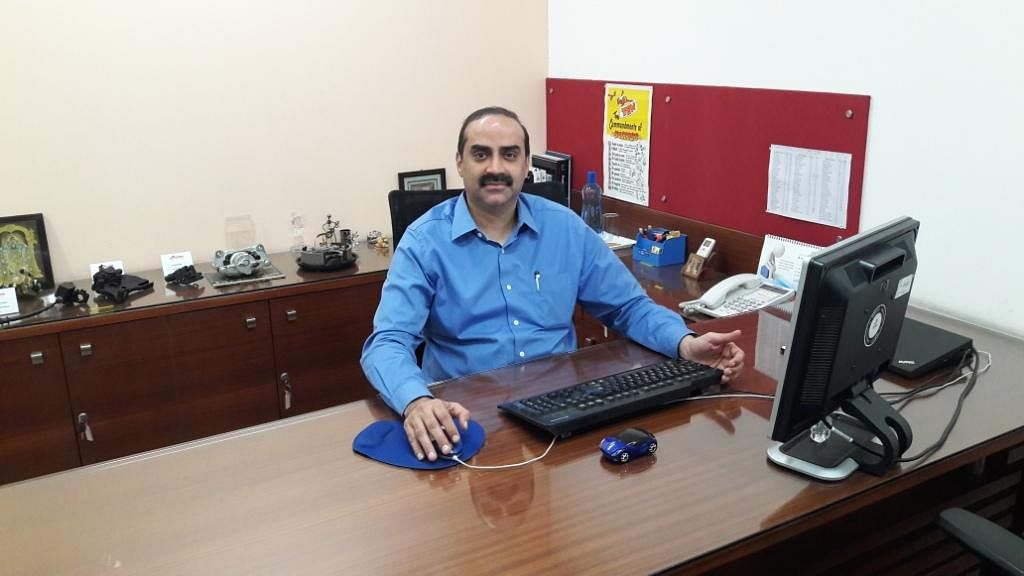Chassis Brakes Int’l targets Rs 1,000 crore India biz by 2020
The growth is slated to come from foraying into the two-wheeler market, consolidation of aftermarket business and offering new advanced braking technologies.
The Netherlands-based Chassis Brakes International (CBI), one of the world’s top three manufacturers of automotive braking solutions, with operations in four continents, is bullish about its growth in India. Represented in India as Foundation Brakes Manufacturing (FBM), its subsidiary, it is primarily engaged in manufacturing foundation brakes and associated components for two-, three- and four-wheelers.
Now, the company, riding on the back of market growth and new business generation, is gunning for a turnover of Rs 1,000 crore by FY2020. In FY2016-17, its India turnover stood at about Rs 700 crore. Of that, the passenger vehicle segment (including three-wheelers and small commercial vehicles up to three tonnes GVW) accounted for the lion’s share with almost Rs 570 crore, followed by Rs 100 crore by aftermarket vertical and roughly Rs 30 crore from two-wheeler industry.
Talking to Autocar Professional about his company’s performance, Anil Khandekar, managing director, FBM and regional president, CBI India, says, “Our performance, specifically the aftermarket business, was impacted with demonetisation last year. However, we posted growth of around 6-7 percent YoY in our overall revenues. Our turnover stood at about Rs 700 crore last year (FY2016-17), and this year we are hoping for a good double-digit growth backed by strong demand from our customers.”

“We see good growth in FY2018, and in FY2019 too. We aim to cross Rs 1,000 crore in next three years (FY2019-2020), backed by new business generation,” he reveals. FBM is a major supplier of drum brakes to passenger car and small CV OEMs including Maruti Suzuki, Renault Nissan, Mahindra & Mahindra (M&M), Toyota Kirloskar Motor, Piaggio Vehicles, Tata Motors and others.
Pillars of growth
Chassis Brakes International is banking on three fundamental pillars of growth to drive its India business in the foreseeable future, besides catering to its existing clients and bagging new orders from them. These pillars include foraying into an all-new segment, consolidation of aftermarket business and offering new advanced braking technologies in the domestic market.
FBM aims to enter the domestic two-wheeler segment, which is touted to be the world’s largest two-wheeler market. Secondly, it plans to add a strategic product to its existing aftermarket portfolio that is expected to drive business. Thirdly, the company is gearing up with electrification of brakes as it looks to explore the market for electronic parking brakes for passenger vehicles.
Marking its entry into India's two-wheeler industry, it has just started catering to a few undisclosed OEMs who are now its new customers on board. Interestingly, according to MP Raajha, vice president and director, sales and engineering, FBM, the first two-wheeler product was launched in Q3 2017. “We have just forayed into the two-wheeler market with our braking solutions. We expect to get a lot of traction in 2018 and 2019, which will incrementally drive our business in the domestic market. On the other hand, we already are a strong player in the three- and four-wheeler segments. We are the second largest brake manufacturers in India in those segments.”
Secondly, on the front of the independent aftermarket, which as per the senior officials contributed in the range of 12-15 percent of FBM’s FY2017 turnover, the company plans to introduce combined braking systems (CBS) for two-wheelers (ideally for up to 125cc models).

Commenting in this context, Raajha reveals, “We are planning to introduce combined brake systems for less than 125cc two-wheelers in the aftermarket with the help of our technical partner J Juan of Spain. This product will go in SOP in Q1 2018. So apart from introducing this product for OEMs, it will also be launched in the aftermarket.”
FBM’s plan of retrofitting CBS as a safety feature to the existing fleet of two-wheelers in the aftermarket is in line with the upcoming statutory requirement, which mandates compulsory fitment of CBS on two-wheelers up to 125cc from 1 April 2018 (for new models) and 1 April 2019 (for existing models).
The company estimates retro-fitment of CBS in aftermarket as a large-scale opportunity in the foreseeable future. On the third front, the company is working to further strengthen its fundamentals by preparing for the future technologies. It anticipates electrification of braking systems driven by the demand for electric parking brakes in premium passenger vehicles.
Providing an update in this context, Raajha says, “As regards electrification of brakes, we are fully geared up to launch electrified brakes in disc and drum architecture. These products are already available off the shelf with our counterparts in Europe. We are also preparing to launch these products in India as we are having extensive discussions with multiple OEMs here. We are trying to catch up with their plans as to when they would like to consider these advanced braking systems for the domestic market.”
The company estimates that the advanced electric parking brakes for passenger vehicle segment (including utility vehicles) will go into mass production starting from 2020. Summarising how 2018 will look like, Raajha highlights, “In 2018, we will be launching six new products across multiple customers in India. This will incrementally add up to our turnover. That’s how we foresee significant growth next year.”
Adding up to that, Khandekar says, “Our business grows in line with how our OEM customers grow. We predominantly record organic growth unless there is some disruptive business vertical or a new channel or a new segment. For example, the launch of CBS in the aftermarket will sort of inorganic growth for us. On the other hand, we want to be ahead in the market when the OEMs demand electrification of braking systems. We want to do so by being the first supplier to introduce electric parking brakes. We see that the braking systems will evolve from conventional brakes to electrified brakes, and this trend will be driven purely by technology and economic benefits.”
Partnering Spain’s J Juan Group
In March 2015, Chassis Brakes International’s India subsidiary (FBM) had entered into a technical agreement with Barcelona-based J Juan Group. Under the technical pact, Chassis Brakes International India could source technologies from the J Juan Group, a known supplier of braking systems and associated components to BMW Motorrad, Ducati, Triumph Motorcycles, Harley- Davidson and many other two-wheeler OEMs, for designing and developing hydraulic disc brakes and master cylinders for two-wheelers up to an engine displacement of 200cc. The aim of this alliance was to tap into the growing opportunities in the Indian two-wheeler market.
Updating on this front, Raajha says, “We have three two-wheeler OEM customers on board with us as of now. Of these, two are among the top four players in India. Furthermore, we are also manufacturing two-wheeler brakes and supplying them back to the J. Juan Group.”
“Our focus is on the domestic market and on expanding our presence in the two-wheeler industry. For now, our hands are full with a lot of projects both from J Juan and other domestic customers. We want to ensure successful launch of these products first and gain customer satisfaction. We expect to generate a lot of new business from these three new two-wheeler customers,” he adds.
Capital investments
Foundation Brakes Manufacturing, with a buzzing order book, is also investing in expanding and upgrading its R&D and production capabilities. “While we are adding new machines and production capacity, simultaneously we are working with our vendors in enhancing their capabilities. We are also hand holding some vendors to take care of the two-wheeler demand, which is a large volume to scale up to,” says Khandekar.
The company is shifting its existing its R&D setup in Chakan to an all-new, independent and bigger facility nearby, which is planned to be more advanced with expensive equipment installations. Sharing details on this front, Khandekar mentions, “We are putting up an all-new engineering test facility in Chakan, it’s a facility wherein under one roof you can validate complete braking systems from two-wheelers to four-wheelers.

We are investing close to Rs 8-10 crore on upgrading our R&D unit in Chakan. The facility is expected to officially commence operations early next year. As we speak, the equipment are being commissioned and installed at the upcoming facility.”
Giving technical details about the upcoming R&D unit, Raajha reveals, “In the new R&D facility, we will be able to simulate braking performance on a vehicle. That will include testing how drivers apply brakes under different conditions and evaluate braking input-output parameters. It will also have a well-equipped NVH (noise-vibration-harshness) lab. We have an acoustic chamber, which can capture noise from the brakes (for 2Ws and 4Ws), put up an appropriate counter measure to make it noise free. Our R&D will also have a vibration test facility wherein brakes will be subjected to extensive long duration durability tests. It will be a well-equipped facility.”
Chassis Brakes International’s India footprint, which employs about 1,400 people, covers the Pune-based design house, Chakan-based R&D unit, Jalgaon-based production plant, Manesar-based assembly plant (for Maruti Suzuki) and 10 warehouses spread across the country to cater to the aftermarket business.
RELATED ARTICLES
BKT, the ‘Off-Road King,’ Chases the Consumer Market
The company has unveiled a broad range of tyres for the Indian two-wheeler and CV markets.
RSB Group Prepares for Hyper-Growth: New Markets, Tech and Mission ₹10,000 Cr
From a small workshop in Jamshedpur to an engineering group with global reach, RSB Transmissions is preparing for its mo...
Beyond Helmets: NeoKavach Wants to Make Rider Airbags India’s Next Safety Habit
As premium motorcycles proliferate and riding culture evolves, an Indo-French venture is betting that wearable airbags, ...






 01 Feb 2018
01 Feb 2018
 24190 Views
24190 Views





 Shahkar Abidi
Shahkar Abidi


 Darshan Nakhwa
Darshan Nakhwa


